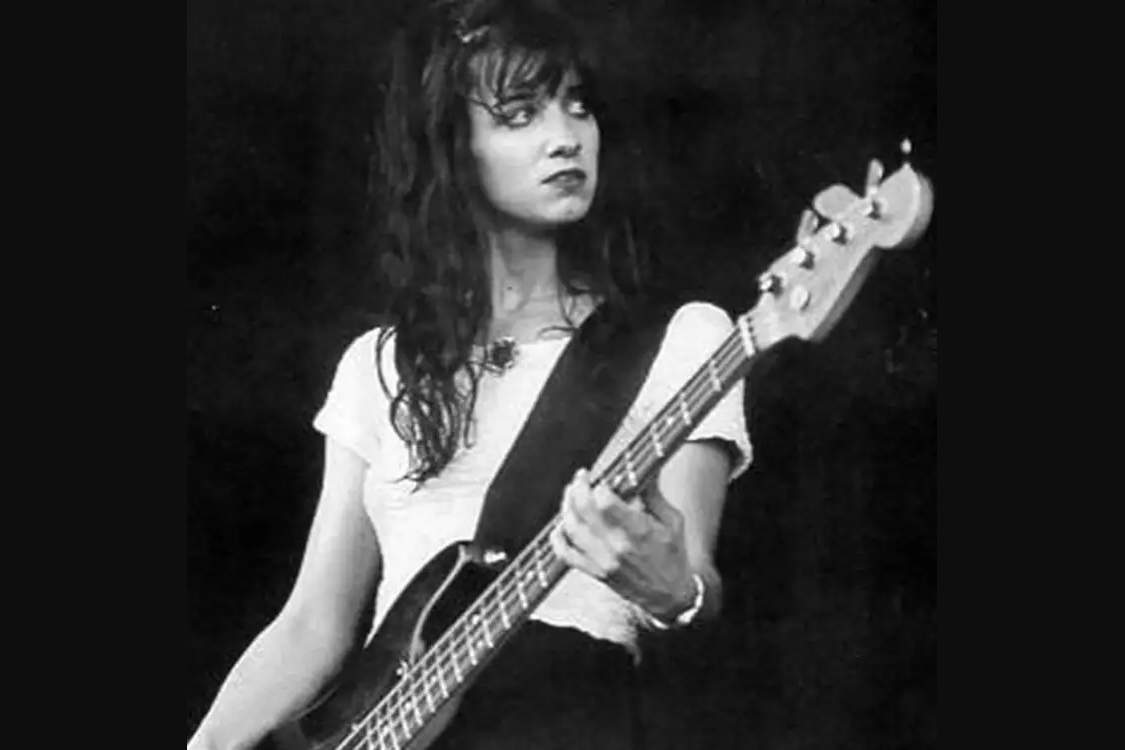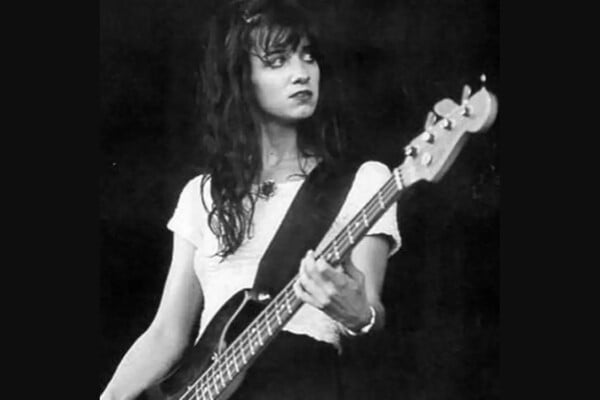Wonder Women: Kristen Pfaff – Part 2

Last year, I wrote a column to give Kristen Pfaff the recognition she deserved… and a permanent place in the No Treble archives. After all, the goal of this article series is twofold: to both interview current female bassists, but also to record the stories of female bassists and preserve them in a searchable archive.
Little did I know that delving into her story would lead me to finding a work in progress: a collaboration between author Guy Mankowski and Jason Pfaff, Kristen’s brother. Using her diary tapes, they were engaged in an effort to create a more complete picture of this enigmatic bassist.
After some conversations with Guy, he’s given me the green light to share a sneak peek from I Know How To Live: The Life Of Kristen Pfaff. The following are excerpts from the first chapter of the book.
Pfaff was unusual. She was someone who, throughout her life, ingratiated herself into new situations that turned out to be influential, and she often became the figurehead of such situations as a result of her natural talents. But on her diary tapes, dark undercurrents within her are revealed. People predominantly know Pfaff for dying of a heroin overdose at 27, but not of the undercurrents which might have led to that. Before writing this book I carried the same misconceptions.
As part of the hugely successful band Hole, during their acclaimed Live Through This era, Pfaff made her creative mark on the world whilst in a highly intense and complex situation. Her band’s leader, Courtney Love, was married to Kurt Cobain of Nirvana, a band that had seized the zeitgeist. It was an inter-band situation, fused by marriage, in which immense, impactful artistry was strongly entwined with intimacy. The power of the work being produced both in the Hole and Nirvana camp — and the ensuing tragedies that would befall both — lead to contradictory accounts from figures within it. Figures known for having been adept at mythologising themselves in a situation which needs no further mythologising.
There was a lot to unravel.
Fans were electrified by Pfaff. Kurt Cobain was — as we will see — in awe of her as a person, and in awe of her artistry. As close friends of Pfaff’s (who have not been on record before) reveal, Cobain and Pfaff secretly considered each other equals in a scene in which people were loath to concede much to others when the spotlight was offering so much. Pfaff suffered from certain people dismissing and denigrating her talents, or from feeling threatened by her. People feared Pfaff’s power. But Pfaff had personal power in spades and was shrewd about deploying it. Her activism helped bring in initiatives that made her university a safer place for women. She brought to Hole’s first hit single the chorus lyrics. People often remarked about falling instantly in love with her; it was a refrain no biographer would anticipate hearing so often. Students who she taught once in classes travelled across the country to attend her funeral, knowing no one else there. But she also suffered extraordinarily, unfairly. From scoliosis, forcing her to wear a metal brace. From being abandoned, unappreciated, from addiction and — we have learnt — terrible bulimia.
There had always been something fascinating about this elusive figure. I had wanted to write a book about Pfaff for a long time, without really knowing why. The motivation to do so only deepened when the obtuseness of the reporting about her life became apparent to me. Pfaff is often dismissed as another member of “The 27 Club,” the macabre categorisation of a group of rock stars — including Jim Morrison and Janis Joplin — who happened to die at 27. Even retrospectives of Hole tend to dismiss her with one line. Stereogum, in their consideration of Hole’s career, said only of her: “Soon after [Cobain’s death] the band’s bassist Kristen Pfaff died of a heroin overdose.” End of consideration.
However, investigation into her life reveals Pfaff to have been far more than a bassist and brief drug user who overdosed on 16th June 1994. Pfaff was also an academic, and a political activist with progressive views way ahead of her time. She was also a powerful creative forced in the internationally-loved Janitor Joe.
Yes, Pfaff’s death is the most frequently-reported fact of her short life. But around this fact is a constellation of other factors which illuminate why Pfaff has been so overlooked as a figure. Foremost is the fact that Nirvana frontman Kurt Cobain died only six weeks before Pfaff, in a death in which heroin was also implicated.
When research for this book began, the name Kurt Cobain came up again and again. It became striking how the factors around Cobain — the inter-band pressures, his impending divorce, and his health problems — were readily considered by people as part of an approach to understanding Cobain. In contrast, by placing Hole within the same genre as Nirvana, Pfaff was depicted as passive.
She was anything but.
Much of the coverage around Pfaff’s death was coloured by the miasma around Cobain’s passing, and tended to dismiss details of her own demise. Writing for Vice magazine, Hannah Ewens dismissively wrote, “when Kristen Pfaff died shortly after [Cobain] of a heroin overdose, it was just a footnote in the shadow of the pop-cultural phenomenon that was Kurt Cobain.”
This is a tendency that began even in the days after Pfaff’s death. When, in August 1994, Seattle Weekly pasted a picture of Pfaff on their cover the headline asked “Did Seattle Kill Kristen Pfaff?” the by-line ran, “after Kurt Cobain’s suicide this rising star wanted to go home. She never made it.” This narrativized the last chapter of Pfaff’s life within the frame of Cobain’s death, even when she was the headline. Considering such depictions, writer Paula Hearsum notes, “the theme of ‘self-destruction is played out notably more strongly with women than men in the music industry, especially in cases where individuals had either taken their own lives or died through reckless behaviour.”
What is fascinating, when you begin to peel back the layers of Pfaff’s life with such materials, is how misguided the popular characterisations of Pfaff often are. People like Pfaff elicit personal devotion from the people who knew them, but they also act as totemic figures for lost eras to which people remained emotionally attached. Particularly if they remind people of a time when their own identities were in an exciting state of possibility.
When I began researching Pfaff’s life I soon realised that drugs played a relatively brief part in it. Hole’s Eric Erlandson said in an interview, “Kristen’s drug use wasn’t bad at all. All those media reports were wrong. She wasn’t a junkie. She dabbled with drugs before she was in our band, in Minneapolis, but it was very light.” Yet on her diary tapes Pfaff records, in the moment, her using drugs in a manner which she knows could be life-threatening. She describes injecting herself with doses that she knows could kill her. She seems to be courting death, articulating poetically the traumatic situation she feels trapped in and using the recordings to reach out to people who she believes are hurting her. As if the recording itself will somehow force them to release her from the pain she is in. Pfaff was further raising the stakes by telling us how close to death she knows her behaviour is taking her.
But she was far more a musician than an addict. In fact, Pfaff was a classically trained musician, whose vocals, piano, guitar and bass playing were central to Live Through This. As Pfaff put it, “I was playing classical music my whole life. It was dainty, and that’s what girls do.” But her mindset about rock music was changed when she saw the scope of it to affect women. Pfaff said, “I was a fan of rock since I was a teenager. But it didn’t really occur to me to play it until I started seeing some female sort of role models on the alternative scene …” Pfaff’s diary tapes reveal the complex, political approach she took to music, and a prodigious awareness of how it could be used to further the feminist cause. Pfaff’s musicianship was steeped in a complex intellectual understanding of political and feminist theory that Pfaff gained before she “graduated herself” from university.
During the end of her tenure with Hole, in her final diary tape, Pfaff reflected on the opportunity she had to “impact the culture,” her voice dripping with irony as she referred to herself as a “womyn in struggle.” This consideration of how her work as a musician can impact the feminist cause is worked into her recordings about her relationship with Courtney Love, and she plays with the idea of sending Love her diary tapes and redressing difficulties between them by sharing recordings in which she made herself so vulnerable. In one recording she implores Courtney Love “not to wear her guitar as a necklace,” adamant it sends a bad message for women. Referencing Juliana Hatfield she says, “fuck you, I’m not a lesser guitar player because my hands are smaller. There’s not a biological propensity for guitar that men have that we don’t so just remember that ok?”
Pfaff also says on these tapes that she was “trying to analyse the motivation to impact the culture,” and decided, “it’s like a sort of duty if you’re given the power to do that. It comes back to potential. It’s not like you’re a fool not to use it; it’s a sin not to use it.” Was her drug use a consequence of the pressure her vast ambitions put her under?
Cutting through the fog to reach the pertinent facts of Pfaff’s life — beyond gender bias, media bias, the biases of narrow “27 Club” reportage or conspiracy theory — was central to gaining a fairer understanding of her. It was only when I had access to Kristen’s private diary recordings, photographs, journals, archives and the wealth of interview footage her brother had painstakingly gathered for a project of his own, that a mission to reclaim Pfaff from misrepresentation began. I was now able to evidence what Pfaff really thought.
I was also able to bring in the real views of those in the Hole camp about her. Through essays and recordings that the Pfaff family shared with me I gained an insight from Pfaff that her family (wary of experiencing further hurt after her death) had not yet heard. I was able to read Pfaff’s academic essays on Marxism, her take on “The Making of the Archetypal Woman in Jean Toomer’s Fern.” As I did so, I realised how much there was to unpack in this complex and multi-dimensional individual. As with the likes of Kurt Cobain and Richey Edwards — other members of the macabre 27 Club who didn’t survive their first Saturn Return — Pfaff retains the youthful lustre and fine cheekbones of one pre-thirties, with a late twenties slightly malnourished sheen. Her unresolved state, in our mind, invites the biographer to ascertain the person she’d have become.
Through interviews with those who had previously never talked about Pfaff — such as her ex partners and fellow activists — an insight was gained which takes us far beyond the existing media portrayal of Pfaff. To allow for the first time a nuanced portrait to be made.
Through the texts she left behind, Pfaff at last gets to speak. The more I can present Pfaff’s unvarnished voice, the better. I hope it allows me to pull Pfaff from the heavy shadows to which she has been abandoned, whilst also resisting any temptation for hagiography.
Pfaff was pro-gay rights, pro feminist values, pro equality. She was critical of the patriarchy, and as a feminist protestor and counsellor she had seen the effects of male oppression up close in her own life, as we will see. Pfaff resisted the misguided puritanism of the day in her progressive thinking; her voice in her journals evidenced this. We hear snatches of this voice, straining against the constraints of such puritanism, in a promotional article Pfaff wrote for her first professional band Janitor Joe. In it, she wrote:
I disagree with Kathleen Hanna [of riot grrrl band Bikini Kill] when she says we should only buy records with girls in them. C’mon — is awareness measurable by gender alone??? Is every girl worth supporting uncritically? Can’t boys be aware of girls’ things too? Isn’t binary thinking something we want to get beyond anyway? While I may argue with a lot of it, I will admit that if riot grrrl had been around when I was younger and coming into an awareness about sexual politics, I might have had a lot more fun than I did with the oppressive and rigid PC culture I grew up in. Shit, they’re not even allowed to say “girl” and “tits” and “pussy” and stuff.
Despite her scepticism of the riot grrrl movement, Pfaff was highly motivated to use whatever abilities she had, and whatever initiatives were in progress, to further the causes she believed in. In an era of vying for the right to self-victimise, Pfaff was, by contrast, proactive. An autodidact who taught herself to play bass. Using this finally released archive material allows us not only to reclaim Pfaff but also allows us to try to reclaim something of the era in which she lived.
You can find out more about the upcoming release of ‘I Know How To Live’: The Life Of Kristen Pfaff here.
Brittany Frompovich is a highly regarded educator, clinician, blogger, and bassist who currently resides in the Washington DC/NOVA region. For more content from Brittany, check out her blog, her YouTube channel, and her Bandcamp site. She also offers handmade unisex music-themed jewelry through her Etsy store. Get a Wonder Woman Tee!

